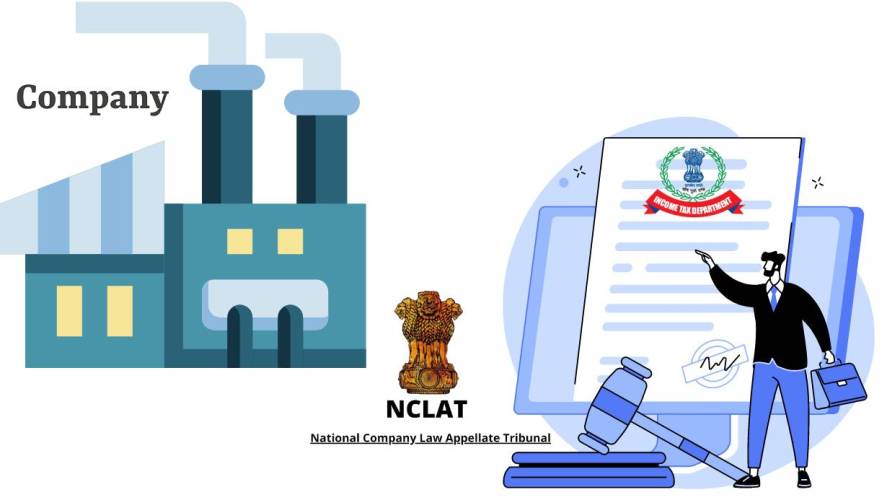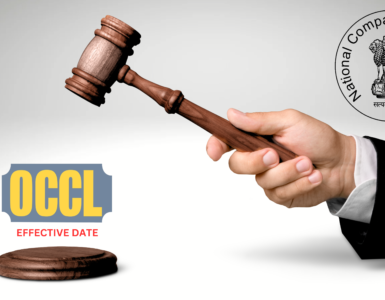Income Tax Department (Appellant) preferred an appeal against decision of Hon’ble NCLT (National Company Law Tribunal) Guwahati Bench in the matter of Assam Company India Ltd (Respondents) vide Company Appeal (AT) (Insolvency) No. 243 of 2022 before Hon’ble National Company Law Appellate Tribunal (NCLAT).
Facts of the case: –
- Financial Creditor filed an application against the respondent for initiation of Corporate Insolvency Resolution Process (CIRP) and the same was admitted via order dated 26.10.2017, subsequently, Resolution plan was approved on 20.09.2018 which do not contain any provision relating to payment of operational creditors and claims made by government authorities.
- Appellant submitted their demand notice on 14.11.2017 (Before approval of Resolution Plan) with resolution professional which were outstanding demand amounting to Rs.16,20,25,953 (Rupees Sixteen Crores Twenty Lakhs Twenty-Five Thousand Nine Hundred Fifty-Three) for the assessment years 13-14 and 14-15 respectively.
- Resolution professional communicated appellant that the claim of the Department would not be admitted since the Respondent has preferred an appeal with the Commissioner of Income Tax (Appeals) for both the aforementioned Assessment Years. The Resolution Professional, however, communicated that after the final order of the CIT(A), the new promoter of the Respondent would pay the demand which is a statutory liability.
- Subsequently, Resolution Professional intimated vide email dated 08.08.2018 that the Hon’ble NCLT Guwahati Bench may consider payment of Rs 1,97,92,084/- being 15% of the outstanding dues owed to the Appellants since the Respondent had filed petition for stay of demand before the Assessing Officer. The Respondent failed to deposit the required tax amount and as such the proposed stay demand was considered “null and void” and the entire amount of Rs 16,20,25,953/- was outstanding and collectible demand as on the date of CIRP.
- Appeal before IT Authorities were dismissed, and the demand of IT authorities sustained. After which upon issuing several notices, amount was not paid hence attachment notices were issued by Income Tax Department.
- Respondent filed a stay petition with NCLT and where attachment orders were set aside by Hon’ble NCLT.
Aggrieved by this decision, the Appellant filed appeal with Hon’ble NCLAT on following grounds: –
- Order of Hon’ble NCLT fails to consider that the Appellants have applied for the recovery of the outstanding demand for the Assessment Year 2013-14 and Assessment Year 2014-15 vide Form B on 14.11.2017 which is prior in time to the resolution plan being approved on 20.09.2018.
- Also, there is an error in the order that Appellants claims cannot be entertained after 15 months of the approval of the Resolution Plan. It is submitted that the Appellants have not made any fresh claims but has laid its right to such claims which were made before the NCLT, Guwahati Bench and which has been duly considered by the Bench.
- Also referred to Case Law of Hon’ble Supreme Court in the matter of State Tax Officer Vs. Rainbow Papers Limited, key highlights of the same are as below: –
- The Adjudicating Authority can approve the Resolution Plan only upon satisfaction that the Resolution Plan, as approved by the Committee of Creditors (CoC), meets the requirements of Section 30(2) of the IBC (Insolvency and Bankruptcy Code). When the Resolution Plan does not meet the requirements of Section 30(2), the same cannot be approved.
- Section 3(30) of the IBC defines secured creditor to mean a creditor in favour of whom security interest is credited. Such security interest could be created by operation of law. The definition of secured creditor in the IBC does not exclude any Government or Governmental Authority.
- Delay in filing a claim cannot be the sole ground for rejecting the claim.
- The dues of the Income Tax Department are government dues and they are secured creditors.
Respondent Reply: –
- Successful Resolution Applicant cannot be burdened with liability after the plan has been approved.
- Section 31 of the IBC clearly states that upon approval of the resolution plan it becomes binding on all the stakeholders including Central Government, State Government or any local authority to whom a debt in respect of the payment of dues arising under any law for the time being in force is owed cannot be burdened with the liability when the resolution plan is already approved.
- Once a plan approved the same cannot be modified or altered.
- The Appellants had filed its claim for Rs. 16,20,25,953/- which was accepted to the extent of Rs. 1,97,92,084/-. The claim of the appellants formed the part of the information memorandum, pursuant to which the successful resolution applicant has already paid an amount of Rs. 1,20,23,691.30. Therefore, the claim raised by the Appellants for Rs. 16,20,25,953/- cannot be accepted as it would lead to a modification of the resolution plan which otherwise is not allowed under IBC.
NCLAT allowed appeal and set-aside the Order of NCLT on following grounds: –
- Appellants placed demand of Income Tax for the Assessment Year 2013-14 for Rs. 6,69,84,657 & Assessment Year 2014-15 for Rs. 9,50,41,296 totalling to Rs. 16,20,25,953/- before the Resolution Professional which were outstanding before the date of admitting the CIRP.
- The Respondent was asked to pay the outstanding demand vide letter no. 674 dated 12.03.2019. However, the Respondent wrote to the Appellants for extinguishing all claims against them relating to the period prior to the date of order of the NCLT since as per the approved resolution plan at clause 12.1 no other amount was to be paid to the Operational Creditors.
- Facts have not been considered by the Hon’ble NCLT while passing the impugned order.
- As per decision of Hon’ble Supreme Court Judgement, in the matter of State Tax Officer Vs. Rainbow Papers Limited, dues of Income Tax Department (Appellant) herein are Government dues and they are Secured Creditors.
Conclusion: –
Thus, it can be stated that government dues are not excluded from definition of secured creditors under IBC. Income Tax Act do not specify charge over properties in case of default in repayment of dues, however in Section 222 of Income Tax Act provides for attachment of properties of assessee in case of default in repayment of dues. Further as per Decision of Hon’ble Supreme Court in case of State Tax Officer Vs. Rainbow Papers Limited, government dues are secured creditors.




